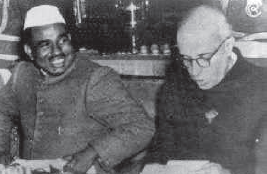Babu Jagjivan Ram
This is a collection of articles archived for the excellence of their content. Readers will be able to edit existing articles and post new articles directly |
Contents |
Babu Jagjivan Ram, Meira Kumar
By Meira Kumar
A many Splendoured Journey
India Harmony VOLUME - 1 : ISSUE - 6 SEPTEMBER-OCTOBER, 2012
1977: against Indira Gandhi
Jun 23 2017, In 1977, he dared to rebel against Indira, The Times of India
Meira Kumar's father Jagjivan Ram was an influential political figure for almost four decades. A very bright student who overcame social discrimination, to which he was subjected because of being Dalit, Ram acquired the reputation of a good administrator and was at ease tackling the complexities of governance: a terrain which politicians often fail to negotiate.
Referred to as `Babuji' in his later years, he was the defence minister when India defeated Pakistan in 1971. His tenure as agriculture minister in the late 1960s saw fruition of the efforts to launch the Green Revolution, leading to food self-sufficiency.
The talented politician had caught the attention of leaders of the freedom struggle when he was a young labour leader working in Kolkata. He was among those who contributed to the All India Depressed Classes League: an outfit of Dalits and others who had suffered social discrimination.
Recognition came early and he was appointed the youngest member of Jawaharlal Nehru's interim cabinet. He remained a minister through the 1970s.
His rise was also facilitated by the Congress leadership's consideration to develop him as a counterweight to Dalit icon B R Ambedkar, whom it had fallen out with.Though Babuji suffered discrimination too, unlike Ambedkar, he did not turn into a rebel against Hinduism: perhaps because his father was deeply religious and, after quitting the Army , became a mahanth of the Shiv Narayani sect. In fact, there are references to Jagjivan `Babu' once attending a conference of Hindu Mahasabha.
He sided with Indira Gandhi when she split the party . In fact, he was made the head of the breakaway faction. Though no tional, the designation reflected his impor tance. However, his re lationship with the Nehru-Gandhi family turned bitter when Indira suspected him of harbouring the ambition of replacing her as PM after the Allahabad HC nullified her election to the Lok Sabha. He was consigned to the political doghouse during the Emergency.
Ram launched a rebellion when Indira announced elec tions in 1977. He and H N Bahuguna formed Congress for Democracy and joined forces with Janata Party to inflict a humiliating defeat on Indira.
He was among those in the running to be PM, and reportedly enjoyed the support of Jaiprakash Narayan. The candidature, however, could not find enough support among Janata Party MPs and Jagjivan Babu had to be content with being deputy PM.Janata Party projected him as its choice for PM in the 1980 polls but was routed.
He left Janata Party to float Congress (J), which turned out to be a spectacular failure. While he somehow scraped through in his Lok Sabha seat of Sasaram in 1984 under controversial circumstances, his party bombed at the hustings. He passed away in 1986.
Babu Jagjivan Ram
Babu Jagjivan Ram with his indomitable will and social reformist zeal so successfully carried forward the torch of the untouchability movement started by Gandhiji.
Babuji's childhood was not as privileged as his daughter's. Son of Sobhi Ram, a soldier in the British Army, he grew up in his native village of Chandwa, Bihar. His father died early after having quit his army job in an act of rebellion, leaving the family to a life of struggle. However, Babuji did not give up his education and in 1922 joined the english medium Arrah Town School. Unfazed by caste discrimination in his school, even being made to drink water from a pot marked “untouchables”, he doggedly continues his education. However, this incident became a turning point that lit in him the lamp of determination to fight a social evil that millions like him had learned to bear over the centuries.
Pandit Madan Mohan Malviya, on a visit to his school was so impressed by his passionate oratory that he invited him to join the Banaras Hindu University where he was awarded the Birla Scholarship. But his Dalit origins hounded him there too. He could not be served food in his hostel room as no attendant was ready to wash his dishes and no barber would give him a hair cut because he was an untouchable. In disgust, he left for Calcutta where he finally earned his B. Sc. Degree from Calcutta University. It was here that he organized conferences and rallies on the issue of discrimination and came to the notice of Subhash Chandra Bose.
His journey as a freedom fighter, social activist and political crusader had begun. The next sixty years were to see him rise from those early troubles to the post of Deputy Prime Minister of India, a national leader who was undisputedly the most charismatic, efficient and committed leader of the backward classes. He contributed to the establishment of the “All India Depressed Classes League” and dedicated himself to attaining equality for untouchables. The rest is history.
In 1985, Babuji had the satisfaction of seeing his daughter Meira Kumar take over the baton from him when she won her first election from Bijnor. It was not a cake walk. In the fray were two other young Dalit leaders, Ram Vilas Paswan and Mayawati. It was a close victory as her two rivals also scored a significant number of votes launching their careers as Dalit icons in the years to come. Much water has flown under the bridge since then.
See also
Babu Jagjivan Ram

